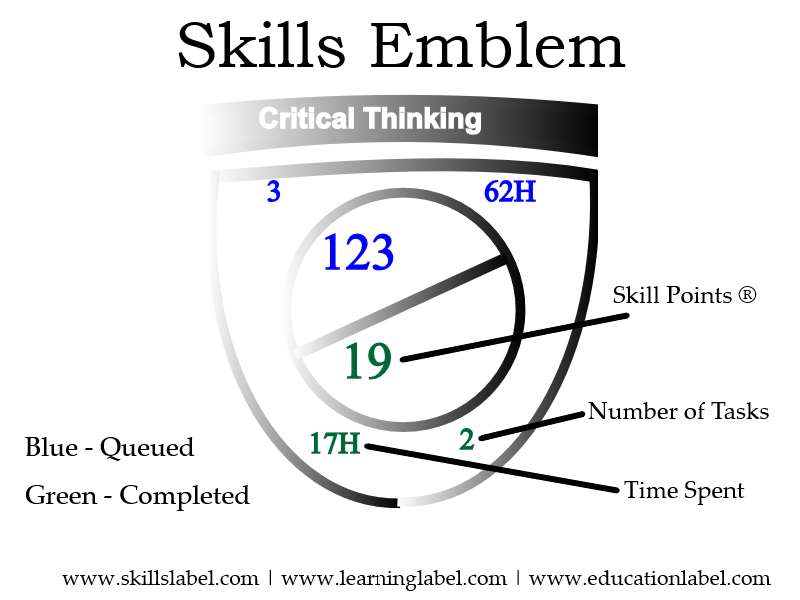I talked with some bright people about a skills mapping project. (Of course, I was excited because I have been working on skills for more than eight years.) I have some work in mapping skills to professions. This research team is looking to work with larger datasets and do something significant. I compiled some of my previous work to answer three questions.
Why map skills to jobs and careers?
Skills define learning. (For me this is what this is all about!) For years, I have been advocating using skills and their methods and applications to define all learning and built a patent pending system to accomplish this – learning labels.
Rather than say someone needs a degree for a job or career (expressed with a few bullets on a resume), lets translate to skills expressed with an emblem (Skill Points®) for each skill and an e-portfolio on a personal website.
Skill Points® represent learning gains in skills on a task level. A proprietary algorithm automatically calculates them as learning labels are created. Education and training standards anchor the learning expectations to a level of difficulty and methods in applying a skill. There are plans to include a verification process through peer review and an accreditation (though this is still being developed).
The theory is skills should be transferable across jobs and careers. For example, if you have thinking and soft skills, they are applicable for a web designer, accountant, or engineer. The differences occur in the technical skills. So, to pivot to another career, simply find the gaps and fill them.
A few reasons why working in skills is valuable:
- New paths to learn skills. There is less reliance on a higher education degree. There are choices: micro-credential paths, bootcamps, certifications, new age apprenticeships, etc. (Higher education institutions still play a role in many of these offerings.) A good example is an accountant; the profession requires a CPA and some coursework, not a four-year degree.
- Future jobs do not exist. “The most in-demand occupations or specialties did not exist 10 or even five years ago, and the pace of change is set to accelerate.”[i] Best to prepare by learning thinking, soft, and other transferable skills, then the necessary technical ones.
- Easier to pivot to different career trajectories. Much of the workforce is not engaged. “Eighty-five percent of employees are not engaged or actively disengaged at work.”[ii] Thinking in degrees made it difficult (almost impossible) to move to another career. Thinking in skills makes it much easier – changing preparation from years to months.
- Required skills are not being learned. Critical thinking is the most important skill for undergraduate education[iii], but not getting improved upon in college[iv]. A majority of employers say students do not have required skills[v]. Skill mapping is more precise.
- Skills instability. The shelf life of forty-two percent of required skills expires in less than five years.[i] Cannot rely on formal education for job preparedness. Re-skilling and up-skilling are lifelong requirements.
What about the perspectives and deeper purpose of knowledge?
And I think some of the learning practitioners I spoke with hesitated to go ‘all-in’ with skills.
I see skills as the ‘verb’ of knowledge, an integral part of the definition of knowledge itself. As said earlier, I think we can define learning in skills for every task or experience.
Retrieving facts and information is useful, providing a basis for much of our communication. Though, technology will significantly improve and augment our abilities in this aspect of knowledge. For example, the profession of a lawyer (where perspective reigns), AI is starting to replace legal research[vi] and Westlaw is highly effective software to find cases.
Learning perspectives matter. Still I think communicating and processing perspectives involves thinking skills. Clearly, constructing perspective is critical in professional and personal development. Within the constructs of the suggestions above, perspectives appear in the e-portfolio – a collection of samples of work. If you are hiring based on a certain set of skills, then review samples of work to get their perspectives.
When you hire someone based on skills and proven level of skill achievements, put them through a work simulation during an onboarding process – a one-month trial. Flesh out the harder to measure skills and perspectives.[vii]
How do you create a skills map?
The group I talked with is still figuring how to do this. Within the framework of applications I work with, learning labels set the ‘wheel’ for matching skills to learning. Skill Points® is a strong representation for a level of achievement with skills. With a learning plan to prepare for a job or career, I suggest summing the number of Skill Points® for each skill and constructing a formula; analogous to using atoms to construct a molecule.[viii]
My team designed and implemented a 'skill map' view, a graphical, colorful layout of the information on a learning label. There is no duplication of work; create a label and get this skill map. Also, created a peer review process using this view. An ideal way for a learning practitioner to quickly grasp the expectations and verify each end point.
A Skills Culture is a growth mindset for learning. Skills-Based Approach is a methodology in working with an evolving skill set through an education and career.
I am excited to work with this group and look forward be a part of their bigger picture skill mapping project.
[i] The Future of Jobs – World Economic Forum.
[ii] https://www.gallup.com/workplace/231668/dismal-employee-engagement-sign-global-mismanagement.aspx
[iii] Bok, Derek. Our Underachieving Colleges.
[iv] Arum, Richard. Academically Adrift.
[v] http://www.skillsculture.com/Blog/Display?name=Root-Causes-of-Skills-Gap
[vi] https://www.forbes.com/sites/cognitiveworld/2019/02/09/will-a-i-put-lawyers-out-of-business/#7111729b31f0
[vii] http://www.skillsculture.com/Blog/Display?name=Project-Based-Learning
[viii] http://www.skillsculture.com/Blog/Display?name=Skills-Mapping
